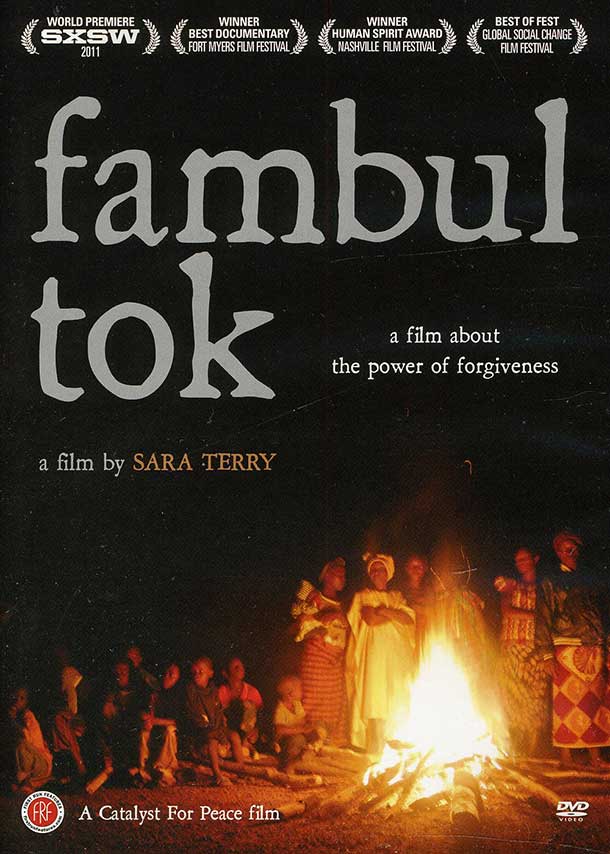Fambul Tok
Friday: 4:00 pm – La Casa Grande
Saturday: 6:30 pm – Rock County Historical Society
 Category: Documentary
Category: Documentary
Country: USA
Language: English
Rating: PG-15
Runtime: 83 min.
Director: Sara Terry
Producer: Rory Kennedy
Website: fambultok.com
Facebook: Fambul Tok
“Fambul Tok” tells the story of healing in post-conflict Sierra Leone through intimate stories of perpetrators and victims, including:
Esther and Joseph – family members caught in the horrors of the war. At age 12 Esther was captured by rebels, and raped by 15 men. Among them was her uncle, Joseph. He, too, had been caught by rebels and ordered to rape Esther – or be killed.
Sahr and Nyumah – best friends whose lives were forever changed by the conflict. Rebel forces turned the two boys on each other, forcing Nyumah to beat his friend so severely that he crippled him – and then forcing him to cut the throat of his friend’s father.
The villagers of Foendor and Tamba Joe, the native son who killed and beheaded 17 members of his own clan. The villagers’ search for Tamba Joe, who has not come home since the war, takes them across Sierra Leone. They are determined to find him – to bring him home to begin the process of reconciliation. During the search, we encounter a surprise character – Captain Mohamed Savage, one of the most notorious figures in the nation’s eleven-year-long war, and a player in the story of Tamba Joe. Prior to this film, Savage had never spoken publicly about his past, despite many efforts by the international community to get him to talk about the war. His engagement with the Tamba Joe story leads him on an unexpected journey of his own.
Our guide through this emotional and cultural landscape is John Caulker, a Sierra Leonean with a vision of peace for his country. He is the creator of Fambul Tok, an unprecedented grass-roots reconciliation program that brings perpetrators and victims face to face in truth-telling and forgiveness ceremonies. In partnership with local communities, Fambul Tok is restoring traditional methods of conflict resolution. It is a purely Sierra Leonean initiative which steps into the void left
by failed international efforts to create peace and justice in the wake of the country’s eleven-year-long civil war.
In “Fambul Tok,” we weave these stories of forgiveness and reconciliation into a vivid portrait of post-conflict healing in Sierra Leone, seen through the lens of family, friends and community. We have been given the remarkable privilege of being the only film crew allowed to film these events.
With Caulker’s help, we explore a culture of forgiveness that is nearly incomprehensible to a Western mindset – a culture that values restoration of relationships and the wholeness of community over punishment and retribution.
The stories of reconciliation are seen through the eyes of Sierra Leoneans, who often say “There is no bad bush to throw away a bad child,” which means that even bad members of the community are needed and must be rehabilitated for the community to thrive. We learn from village chiefs and “mommy queens” (women leaders), from elders and youth, victims and perpetrators, about a culture that values the wholeness of community, that defines peace as being able to eat from one bowl, as one family.
On a larger scale, this film illumines one of the most critical issues in post-conflict peacebuilding — — the failure of the West to recognize and support local cultural values and traditions in peacemaking efforts. “Fambul Tok” challenges the neo-colonial concept that Africa needs to be “saved” by the West, and explores community-based traditions as a viable form of building sustainable peace, that have proven – in Sierra Leone – to be more successful than Western efforts to heal divided communities.
The film also raises questions about the international community’s efforts in Africa to create peace through Western-based traditions of crime and punishment. “Fambul Tok,” provides the West with a first-hand example of new/old ways of imagining and building sustainable peace in post-conflict settings.

